Unit 10 You're supposed to shake hands. Section A Grammar Focus课件(共45张PPT)
文档属性
| 名称 | Unit 10 You're supposed to shake hands. Section A Grammar Focus课件(共45张PPT) |
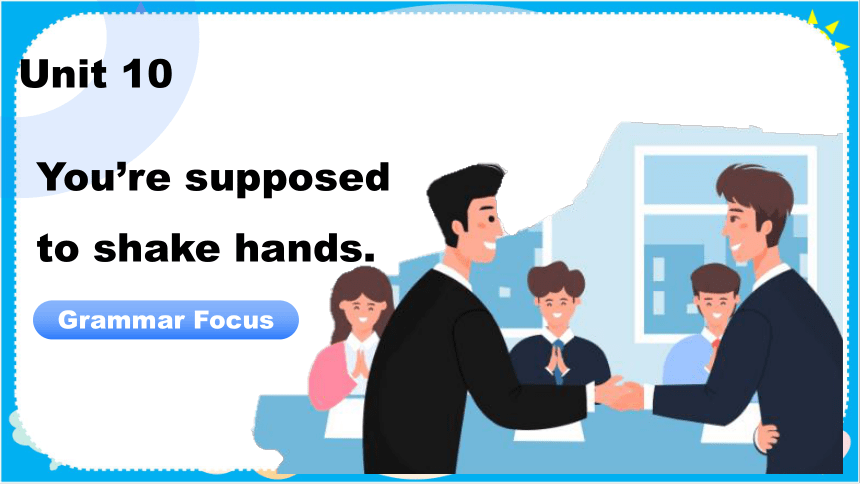
|
|
| 格式 | pptx | ||
| 文件大小 | 7.3MB | ||
| 资源类型 | 教案 | ||
| 版本资源 | 人教新目标(Go for it)版 | ||
| 科目 | 英语 | ||
| 更新时间 | 2023-12-27 06:38:43 | ||
图片预览

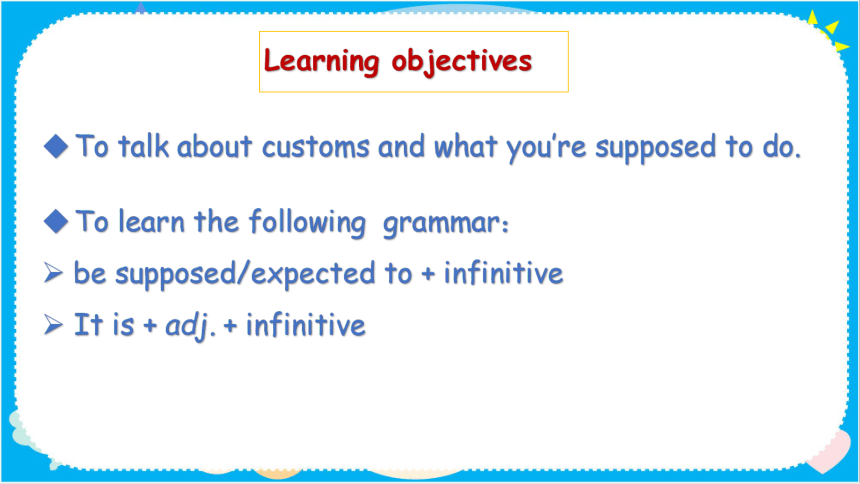
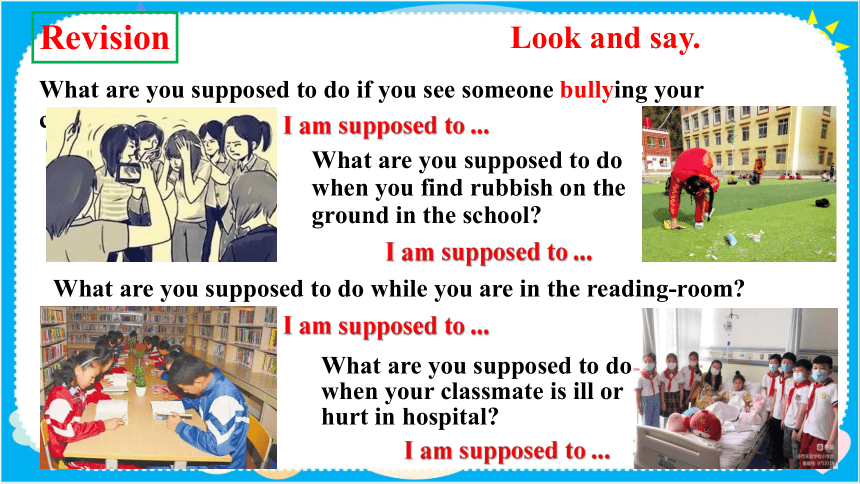
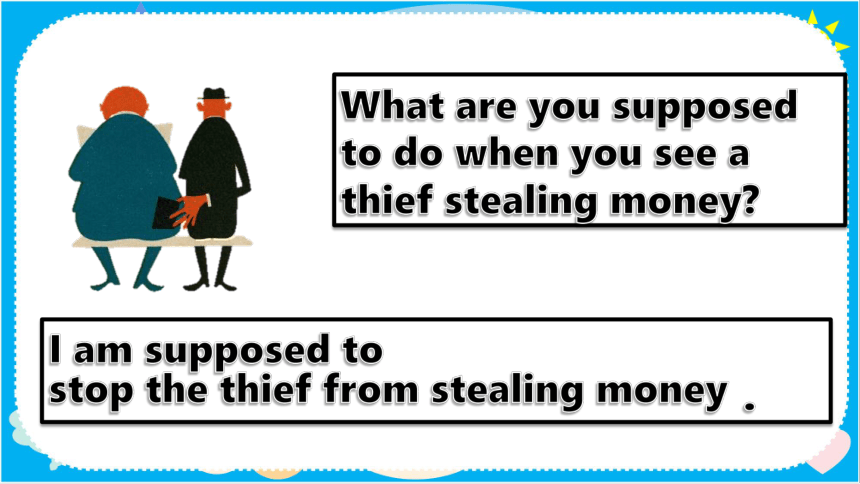



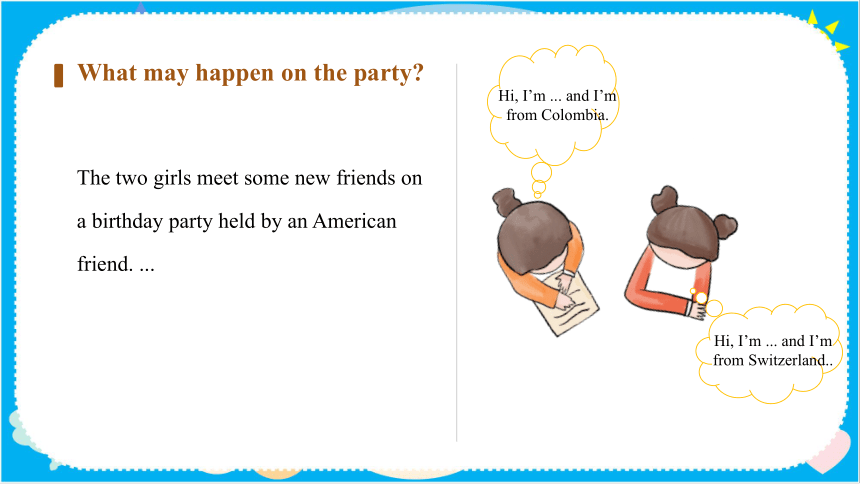
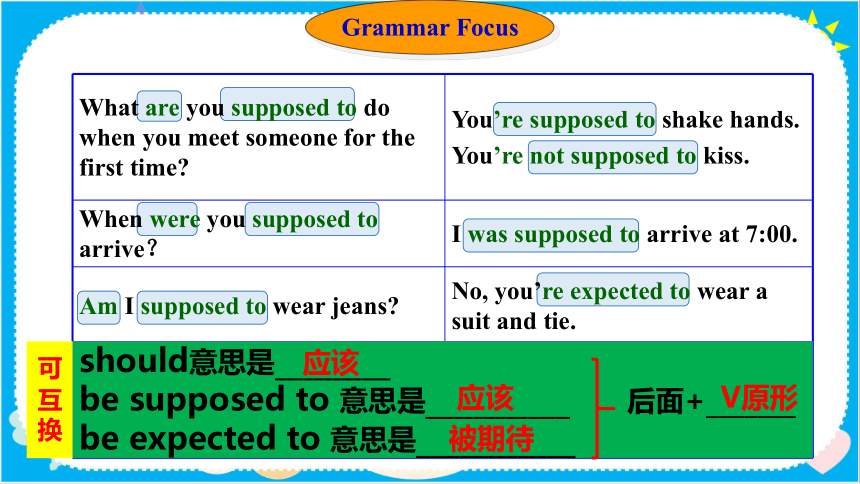
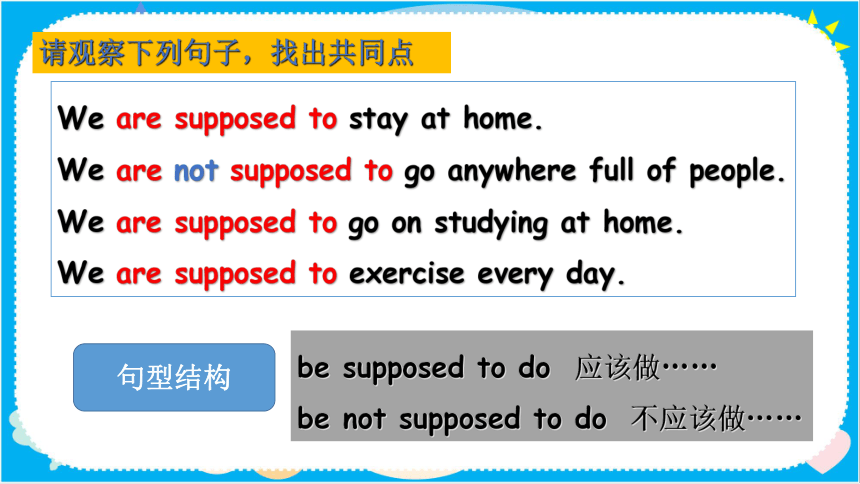
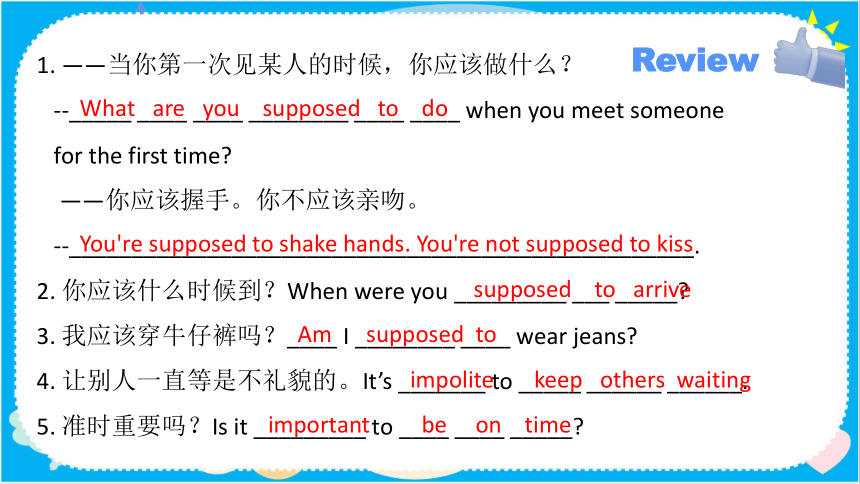
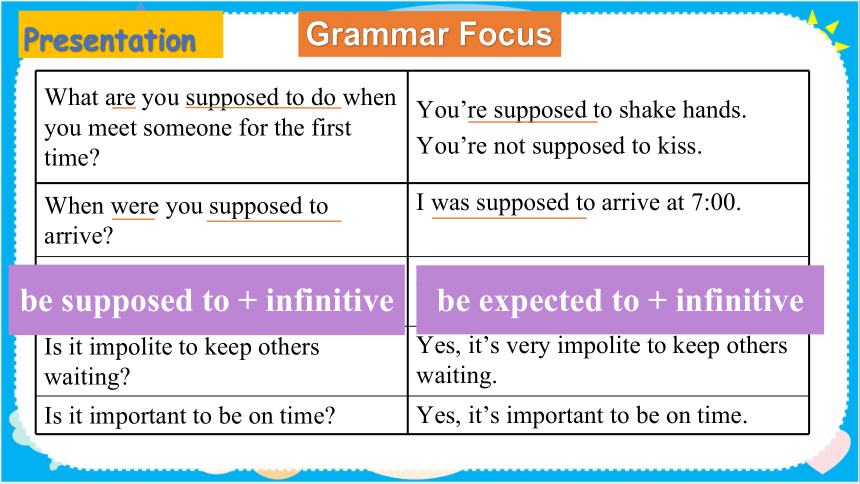
文档简介
(共45张PPT)
Unit 10
You’re supposed to shake hands.
Grammar Focus
To talk about customs and what you’re supposed to do.
To learn the following grammar:
be supposed/expected to + infinitive
It is + adj. + infinitive
Learning objectives
Presentation
Revision
Look and say.
What are you supposed to do if you see someone bullying your classmates
What are you supposed to do when you find rubbish on the ground in the school
I am supposed to ...
I am supposed to ...
What are you supposed to do while you are in the reading-room
What are you supposed to do when your classmate is ill or hurt in hospital
I am supposed to ...
I am supposed to ...
What are you supposed to do when you see a thief stealing money
I am supposed to
.
stop the thief from stealing money
What are you supposed to do when someone asksyou the way
I am supposed to
.
show her/him the way
Lead in
As students, what should we do at this time
We are supposed to stay at home.
We are not supposed to go anywhere full of people.
As students, what should we do
We are supposed to go on studying at home.
We are supposed to exercise every day.
Hi, I’m ... and I’m from Switzerland..
Hi, I’m ... and I’m from Colombia.
What may happen on the party
The two girls meet some new friends on a birthday party held by an American friend. ...
、
What are you supposed to do when you meet someone for the first time You’re supposed to shake hands.
You’re not supposed to kiss.
When were you supposed to arrive? I was supposed to arrive at 7:00.
Am I supposed to wear jeans No, you’re expected to wear a suit and tie.
Is it impolite to keep others waiting Yes, it’s very impolite to keep others waiting.
Is it important to be on time Yes, it’s important to be on time.
Grammar Focus
should意思是________
be supposed to 意思是__________
be expected to 意思是___________
应该
被期待
可
互
换
应该
后面+_______
V原形
We are supposed to stay at home.
We are not supposed to go anywhere full of people.
We are supposed to go on studying at home.
We are supposed to exercise every day.
请观察下列句子,找出共同点
be supposed to do 应该做……
be not supposed to do 不应该做……
句型结构
1. ——当你第一次见某人的时候,你应该做什么?
--_____ ____ ____ ________ ____ ____ when you meet someone
for the first time
——你应该握手。你不应该亲吻。
--__________________________________________________.
2. 你应该什么时候到?When were you _________ ___ _____
3. 我应该穿牛仔裤吗?____ I ________ ____ wear jeans
4. 让别人一直等是不礼貌的。It’s _______ to _____ ______ ______.
5. 准时重要吗?Is it _________ to ____ ____ _____
What are you supposed to do
You're supposed to shake hands. You're not supposed to kiss
supposed to arrive
Am supposed to
impolite keep others waiting
important be on time
Review
What are you supposed to do when you meet someone for the first time You’re supposed to shake hands.
You’re not supposed to kiss.
When were you supposed to arrive I was supposed to arrive at 7:00.
Am I supposed to wear jeans No, you’re expected to wear a suit and tie.
Is it impolite to keep others waiting Yes, it’s very impolite to keep others waiting.
Is it important to be on time Yes, it’s important to be on time.
Grammar Focus
Presentation
be supposed to + infinitive
be expected to + infinitive
be supposed to的用法
be supposed to do sth 相当于 should do sth 或者be expected to do sth. 人称、时态和句式体现在be的变化上,to为不定式,后接动词原形。
句式:
1)肯定句: be supposed to do sth.
2)否定句: be not supposed to do sth.
相当于:shouldn’t do sth. be not allowed to do sth.
意为:不应当做某事;不被允许做某事
3)疑问句: be supposed to do sth 的疑问句是将be动词的相应形式提到主语前。
拓展:expect是及物动词,意为“预料,盼望”,还有其它用法:
①、expect + n. / pron. 预计……发生;期待某人或某物
I expect a snowstorm. 我预计会有一场暴风雪。
②、expect( sb.) to do sth. 期望(某人)做某事
The old man is expecting his daughter to visit him.这个老人盼望着他女
儿的到访。
③、expect + 从句 预计 / 料想……
I didn’t expect that you would get there so soon. 我没想到你会这么快就到达那里了。
be supposed to的用法
当主语是人时:
be supposed to的主语是人时,意为“应该……”,用来表示劝告、建议、责任等。
e.g. We’re supposed to spread positive energy everywhere we go.
当主语是事或物时:
be supposed to的主语是事或物时,意为“本该,本应”,用于表示某事本应该发生而没有发生。
e.g. The meeting was supposed to take place on Tuesday, but we’ve had to put it off.
be supposed to的否定用法
否定形式:be not supposed to do sth. ,相当于be not allowed to do sth., 意为“不应该做某事”。
1) be supposed to have done表示“本应该做某事(实际上没做)”,相当于should have done。
He was supposed to have arrived an hour ago.
You are supposed to have done your homework.
2) be supposed to还可表示“被认为……;被相信……”。
The dolphins are supposed to be very clever.
完成句子。
1.我们应该多读书。
We ____________________ more books.
2. 你不应该把你的自行车放在这里。
You _____________________ your bike here.
are supposed to read
aren’t supposed to put
3.我本应该今天上午完成作业的,但我忘了。
I ________________________ the homework this morning, but I forgot it.
4. Jack被要求每天早上练习英语。
Jack _________________________ English every morning.
was supposed to finish
is expected to practice
Exercises
The number of shared bike users ____________ reach 50 million this year. (expect)
共享单车的使用人数今年有望达到五千万。
is expected to
the number of n[C].复数 + v. 单数 …的数量
a number of n[C].复数 + v. 复数 许多的…
Grammar
be supposed to do sth. 意为“应该做……,某人被期望做……”,相当于 should;
be expected to do sth.意为“应该……;被期望……”
两者都用来表示根据规定或传统习惯应该做某事或期待某事发生,两者中的to为不定式符号,后接动词原形。
be supposed/expected to的用法
be expected to do sth.
“被期许(预期)会做某事, 希望做某事, 表示一种可能性。
e.g. She was expected to arrive before dinner.
希望她晚餐前到达。
be supposed to do相对于be expected to do主观性更强一些。
be supposed to do sth. & be expected to do sth.的区别
Presentation
单项选择
Everyone is supposed _____ a seat belt in the car.
A. wearing B. to wear C. to be worn D. wear
2. —How was your dinner at Peter’s house
—Embarrassing. I ______ to arrive at 6:30, but I got there at 7:00.
A. Expects B. have expected
C. am expecting D. was expected
Exercises
3. —Why are you so late You _______ get here at seven.
—Sorry. I was caught in a traffic jam.
A. were supposed to B. liked to
C. expected to D. were hoped to
4. It’s our duty ______ our hometown clean and beautiful. We must do something for it.
A. keeping B. keeps C. to keep D. kept
5. It is important _______ us to make full use of time.
A. for B. of C. with D. to
Grammar Focus
What are you supposed to do when you meet someone for the first time You’re supposed to shake hands.
You’re not supposed to kiss.
When were you supposed to arrive I was supposed to arrive at 7:00.
Am I supposed to wear jeans No, you’re expected to wear a suit
and tie.
Is it impolite to keep others waiting Yes, it’s very impolite to keep others
waiting.
Is it important to be on time Yes, it’s important to be on time.
It’s important to do sth.
It’s impolite to do sth.
Grammar Focus
二、“It be+形容词+to do sth.”句型
“It be+形容词+to do sth.”意为“做某事是……的”,其中,it是形式主语,真正的主语是后面的动词不定式。常用于此句型的形容词有:important、necessary、easy、difficult 等。
e.g. It’s easy to learn English if you work hard.
如果你努力,学习英语很容易。
It is + adj. (for sb.) + to do sth. 意为“做某事是……的”,其中It为形式主语,真正的主语是后面的动词不定式I think it is important to sleep for eight hours a night.
It is + adj. + to do sth. 的用法
形式主语
真正的主语
【拓展延伸】在该结构中,有时在to do sth.前加上for/of sb.,表示动词不定式(短语)的逻辑主语。其用法如下:
如:在河里游泳对你很危险。
It is dangerous _______ to swim in the river.
你能够帮助了,你真是太善良了。
It is kind _______ to help me.
for you
of you
1. It is+adj.+(for sb.) to do sth.常用于表示事物的特征、特点,常用描述事物性质的形容词,如difficult, easy, hard, important, (im)possible, dangerous等。
e.g. It’s not easy for the man to support such a big family.
2. It is+adj.+(of sb.) to do sth. adj.描述的是人的性格、品质特征。这类形容词有kind, good, nice, polite, clever, careless, foolish等。
e.g. It is kind of you to help me.
It’s very clever of the little girl to think of a good idea to solve the problem.
辨析:“It is+adj.+(for sb.) to do sth.”和“It is+adj.+(of sb.) to do sth.”
It is necessary ____ us to help our friends out when they meet difficulties.
A.to B.of C.with D.for
可用固定搭配法解答本题。在句型“It be+形容词(for/of sb.)+to do sth.”中,of 前的形容词通常是描述人的品质、性格的,for前的形容词通常是描述事物特征的。句中的形容词necessary并非指人的品质,而是描述事物的特征,所以此处用for。
典例
点拨
D
Grammar Focus
用 for 或 of 填空:
It was foolish ___ him to go alone. 他单独去太傻了。
It’s dangerous ___ us to hang out at midnight.
在午夜闲逛对我们来说太危险了。
of
for
It’s really ____ him to drive after drinking so much wine.
A. crazy of B. gentle of C. brave for D. wise for
1. When you go abroad, it _____________ bring your passport.
2. After class, students ______________________ clean the
chalk off the blackboard.
3. If you visit the northern coast of Norway during the winter
season, it _______________ pack warm clothes.
4. If there are people in the meeting room, you _____________
knock before entering.
5. In many eastern European countries, you ___________ take
off your gloves before shaking hands.
Practice
plete the sentences with the phrases in the box.
be supposed to
be expected to
be important to
is important to
are supposed/expected to
is important to
are supposed to
are expected/ supposed to
4b. Fill in the blanks with the correct forms of the words in brackets.
Each country has different rules about social situations. A traveler ____________________ (not expect; know) all of these, but it is helpful ________(learn) as many of these customs as possible. One of the best ways to be accepted in a foreign country is to try ________________ (understand) how people think. Learning what you _________________ (suppose; do) and __________________ (not suppose; do) in social situations may be difficult, but it is worth the trouble if you want to understand another culture.
is not expected to know
to learn
to understand
are supposed to do
not supposed to do
Practice
Role-play
Make a list of advice for someone coming to your country as an exchange student for the first time. Work with your group to give advice about:
time what to do for someone’s birthday
meeting people visiting someone’s home
table manners giving gifts
You are (not) supposed to ...
You are expected to ...
It’s important to ...
It’s polite to ...
It’s impolite/rude to ...
Make a list of advice for someone coming to your country as an exchange student for the first time. Work with your group to give advice about:
4c
· time · what to do for someone’s birthday
· meeting people · visiting someone’s home
· table manners · giving gifts
4c
Make a list of advice for someome coming to your country as an exchange student for the first time. work with your group to give advise about:
what to do for someone’ birthday
visiting someone’s home
giving gifts
time
meeting people
table manners
In China, you are supposed to....... you are expected to....
It’s impostant to......
★ time: ★ what to do for someone’s birthday
★ meeting people ★ visiting someone’s home
★ table manners ★ giving gifts
on time or little earlier
festival gifts being necessary
call first, and knock at the door
say “Hello/Hi …” with a smile
giving birthday gifts
older people eating first
A: If you want to visit someone’s home, you’re supposed to …
B: Yes, you’re not expected to …
1.After class, students are supposed/expected to clean the chalk off the blackboard. 下课后,学生们应该擦掉黑板上的粉笔字。
clean ... off意为“把……擦掉”。
e.g. Can they clean off all these finger marks
他们能够把这些指痕全部擦掉吗?
Please clean them off. 请把它们擦掉。
clean up意为“打扫(或清除)干净”。
e.g. Boys and girls, please clean up your desks.
同学们,请把你们的书桌收拾干净。
拓展
2. … but it is worth the trouble if you want to understand another culture.
worth /w (r)θ/ adj. 值得;有……价值(的)
worth作形容词,常用搭配:
The book is well worth reading.
The museum is certainly worth a visit.
The ring is worth 5,000 yuan.
Language points
worth后接v.-ing时,用主动形式表示被动意义。
sth. be (well) worth doing 某事(很)值得做
(不用be very worth doing)
worth adj. 值得;有…价值(的)
The film Operation Red Sea is well worth seeing.
《红海行动》这部电影很值得看。
翻译:武汉大学确实值得参观。
Wuhan University is really worth visiting.
Language points
3) be worth + 钱 值多少钱
The painting is worth 3,000 yuan.
这幅画值3000元。
2) be worth sth. 值得…
The newly opened museum is certainly worth a visit.
那个新开的博物馆当然值得参观。
worth a visit / the trouble 值得参观 / 麻烦的
Language points
2. table manners
manner n. 方式;方法 (pl.) 礼貌;礼仪
manner作名词,在此处用复数形式,意为“礼貌;礼仪”。good manners意为“有礼貌”,bad manners意为“没礼貌”。
We all like people with good manners.
(2) manner 作名词,还可意为“方式;方法”。
The problem should be solved in a fair manner.
肯定式
否定式
疑问式
be supposed to do sth.
Grammar
It be+形容词+ for sb.+ to do sth.
It be+形容词+of sb.+ to do sth.
It be+形容词+to do sth.
Exercises
单项选择
1. —What makes you ________ we’re going to sell the house
—I hear that you’ve got a job abroad.
A. doubt B. wonder C. promise D. suppose
2. —Could I go swimming with my friend, Dad
—No, it’s very dangerous for you kids ________ swimming
without adults.
A. go B. going C. to go D. went
3. —Tom, you are expected ________ the flowers today.
—OK. I will do it right now.
A. water B. to water C. watering D. to watering
4. It is wise ________ Linda to make up her mind ________ to
play an instrument.
A. for; learning B. for; to learn C. of; learning D. of; to learn
二. 根据汉语翻译补全句子。
1. 你应该握手。You ____ _________ ___ _______ _______.
2. —你应该什么时候到?—我应该7点钟到。
—When were you _________ ___ _______
—I _____ _________ ___ _______ at 7:00.
3. —让别人一直等待不礼貌吗?
—对, 让别人一直等很不礼貌。
—___ ___ _________ to keep others waiting
—Yes, it’s very impolite to keep others waiting.
4. —准时很重要吗?
—是的, 准时是很重要。
—Is ___ _________ ___ ___ on time
—Yes, it’s important to be on time.
are supposed to shake hands
supposed to arrive
was supposed to arrive
Is it impolite
it important to be
Homework
Read and recite Grammar Focus.
To introduce Chinese customs by using the sentence patterns in this class.
Unit 10
You’re supposed to shake hands.
Grammar Focus
To talk about customs and what you’re supposed to do.
To learn the following grammar:
be supposed/expected to + infinitive
It is + adj. + infinitive
Learning objectives
Presentation
Revision
Look and say.
What are you supposed to do if you see someone bullying your classmates
What are you supposed to do when you find rubbish on the ground in the school
I am supposed to ...
I am supposed to ...
What are you supposed to do while you are in the reading-room
What are you supposed to do when your classmate is ill or hurt in hospital
I am supposed to ...
I am supposed to ...
What are you supposed to do when you see a thief stealing money
I am supposed to
.
stop the thief from stealing money
What are you supposed to do when someone asksyou the way
I am supposed to
.
show her/him the way
Lead in
As students, what should we do at this time
We are supposed to stay at home.
We are not supposed to go anywhere full of people.
As students, what should we do
We are supposed to go on studying at home.
We are supposed to exercise every day.
Hi, I’m ... and I’m from Switzerland..
Hi, I’m ... and I’m from Colombia.
What may happen on the party
The two girls meet some new friends on a birthday party held by an American friend. ...
、
What are you supposed to do when you meet someone for the first time You’re supposed to shake hands.
You’re not supposed to kiss.
When were you supposed to arrive? I was supposed to arrive at 7:00.
Am I supposed to wear jeans No, you’re expected to wear a suit and tie.
Is it impolite to keep others waiting Yes, it’s very impolite to keep others waiting.
Is it important to be on time Yes, it’s important to be on time.
Grammar Focus
should意思是________
be supposed to 意思是__________
be expected to 意思是___________
应该
被期待
可
互
换
应该
后面+_______
V原形
We are supposed to stay at home.
We are not supposed to go anywhere full of people.
We are supposed to go on studying at home.
We are supposed to exercise every day.
请观察下列句子,找出共同点
be supposed to do 应该做……
be not supposed to do 不应该做……
句型结构
1. ——当你第一次见某人的时候,你应该做什么?
--_____ ____ ____ ________ ____ ____ when you meet someone
for the first time
——你应该握手。你不应该亲吻。
--__________________________________________________.
2. 你应该什么时候到?When were you _________ ___ _____
3. 我应该穿牛仔裤吗?____ I ________ ____ wear jeans
4. 让别人一直等是不礼貌的。It’s _______ to _____ ______ ______.
5. 准时重要吗?Is it _________ to ____ ____ _____
What are you supposed to do
You're supposed to shake hands. You're not supposed to kiss
supposed to arrive
Am supposed to
impolite keep others waiting
important be on time
Review
What are you supposed to do when you meet someone for the first time You’re supposed to shake hands.
You’re not supposed to kiss.
When were you supposed to arrive I was supposed to arrive at 7:00.
Am I supposed to wear jeans No, you’re expected to wear a suit and tie.
Is it impolite to keep others waiting Yes, it’s very impolite to keep others waiting.
Is it important to be on time Yes, it’s important to be on time.
Grammar Focus
Presentation
be supposed to + infinitive
be expected to + infinitive
be supposed to的用法
be supposed to do sth 相当于 should do sth 或者be expected to do sth. 人称、时态和句式体现在be的变化上,to为不定式,后接动词原形。
句式:
1)肯定句: be supposed to do sth.
2)否定句: be not supposed to do sth.
相当于:shouldn’t do sth. be not allowed to do sth.
意为:不应当做某事;不被允许做某事
3)疑问句: be supposed to do sth 的疑问句是将be动词的相应形式提到主语前。
拓展:expect是及物动词,意为“预料,盼望”,还有其它用法:
①、expect + n. / pron. 预计……发生;期待某人或某物
I expect a snowstorm. 我预计会有一场暴风雪。
②、expect( sb.) to do sth. 期望(某人)做某事
The old man is expecting his daughter to visit him.这个老人盼望着他女
儿的到访。
③、expect + 从句 预计 / 料想……
I didn’t expect that you would get there so soon. 我没想到你会这么快就到达那里了。
be supposed to的用法
当主语是人时:
be supposed to的主语是人时,意为“应该……”,用来表示劝告、建议、责任等。
e.g. We’re supposed to spread positive energy everywhere we go.
当主语是事或物时:
be supposed to的主语是事或物时,意为“本该,本应”,用于表示某事本应该发生而没有发生。
e.g. The meeting was supposed to take place on Tuesday, but we’ve had to put it off.
be supposed to的否定用法
否定形式:be not supposed to do sth. ,相当于be not allowed to do sth., 意为“不应该做某事”。
1) be supposed to have done表示“本应该做某事(实际上没做)”,相当于should have done。
He was supposed to have arrived an hour ago.
You are supposed to have done your homework.
2) be supposed to还可表示“被认为……;被相信……”。
The dolphins are supposed to be very clever.
完成句子。
1.我们应该多读书。
We ____________________ more books.
2. 你不应该把你的自行车放在这里。
You _____________________ your bike here.
are supposed to read
aren’t supposed to put
3.我本应该今天上午完成作业的,但我忘了。
I ________________________ the homework this morning, but I forgot it.
4. Jack被要求每天早上练习英语。
Jack _________________________ English every morning.
was supposed to finish
is expected to practice
Exercises
The number of shared bike users ____________ reach 50 million this year. (expect)
共享单车的使用人数今年有望达到五千万。
is expected to
the number of n[C].复数 + v. 单数 …的数量
a number of n[C].复数 + v. 复数 许多的…
Grammar
be supposed to do sth. 意为“应该做……,某人被期望做……”,相当于 should;
be expected to do sth.意为“应该……;被期望……”
两者都用来表示根据规定或传统习惯应该做某事或期待某事发生,两者中的to为不定式符号,后接动词原形。
be supposed/expected to的用法
be expected to do sth.
“被期许(预期)会做某事, 希望做某事, 表示一种可能性。
e.g. She was expected to arrive before dinner.
希望她晚餐前到达。
be supposed to do相对于be expected to do主观性更强一些。
be supposed to do sth. & be expected to do sth.的区别
Presentation
单项选择
Everyone is supposed _____ a seat belt in the car.
A. wearing B. to wear C. to be worn D. wear
2. —How was your dinner at Peter’s house
—Embarrassing. I ______ to arrive at 6:30, but I got there at 7:00.
A. Expects B. have expected
C. am expecting D. was expected
Exercises
3. —Why are you so late You _______ get here at seven.
—Sorry. I was caught in a traffic jam.
A. were supposed to B. liked to
C. expected to D. were hoped to
4. It’s our duty ______ our hometown clean and beautiful. We must do something for it.
A. keeping B. keeps C. to keep D. kept
5. It is important _______ us to make full use of time.
A. for B. of C. with D. to
Grammar Focus
What are you supposed to do when you meet someone for the first time You’re supposed to shake hands.
You’re not supposed to kiss.
When were you supposed to arrive I was supposed to arrive at 7:00.
Am I supposed to wear jeans No, you’re expected to wear a suit
and tie.
Is it impolite to keep others waiting Yes, it’s very impolite to keep others
waiting.
Is it important to be on time Yes, it’s important to be on time.
It’s important to do sth.
It’s impolite to do sth.
Grammar Focus
二、“It be+形容词+to do sth.”句型
“It be+形容词+to do sth.”意为“做某事是……的”,其中,it是形式主语,真正的主语是后面的动词不定式。常用于此句型的形容词有:important、necessary、easy、difficult 等。
e.g. It’s easy to learn English if you work hard.
如果你努力,学习英语很容易。
It is + adj. (for sb.) + to do sth. 意为“做某事是……的”,其中It为形式主语,真正的主语是后面的动词不定式I think it is important to sleep for eight hours a night.
It is + adj. + to do sth. 的用法
形式主语
真正的主语
【拓展延伸】在该结构中,有时在to do sth.前加上for/of sb.,表示动词不定式(短语)的逻辑主语。其用法如下:
如:在河里游泳对你很危险。
It is dangerous _______ to swim in the river.
你能够帮助了,你真是太善良了。
It is kind _______ to help me.
for you
of you
1. It is+adj.+(for sb.) to do sth.常用于表示事物的特征、特点,常用描述事物性质的形容词,如difficult, easy, hard, important, (im)possible, dangerous等。
e.g. It’s not easy for the man to support such a big family.
2. It is+adj.+(of sb.) to do sth. adj.描述的是人的性格、品质特征。这类形容词有kind, good, nice, polite, clever, careless, foolish等。
e.g. It is kind of you to help me.
It’s very clever of the little girl to think of a good idea to solve the problem.
辨析:“It is+adj.+(for sb.) to do sth.”和“It is+adj.+(of sb.) to do sth.”
It is necessary ____ us to help our friends out when they meet difficulties.
A.to B.of C.with D.for
可用固定搭配法解答本题。在句型“It be+形容词(for/of sb.)+to do sth.”中,of 前的形容词通常是描述人的品质、性格的,for前的形容词通常是描述事物特征的。句中的形容词necessary并非指人的品质,而是描述事物的特征,所以此处用for。
典例
点拨
D
Grammar Focus
用 for 或 of 填空:
It was foolish ___ him to go alone. 他单独去太傻了。
It’s dangerous ___ us to hang out at midnight.
在午夜闲逛对我们来说太危险了。
of
for
It’s really ____ him to drive after drinking so much wine.
A. crazy of B. gentle of C. brave for D. wise for
1. When you go abroad, it _____________ bring your passport.
2. After class, students ______________________ clean the
chalk off the blackboard.
3. If you visit the northern coast of Norway during the winter
season, it _______________ pack warm clothes.
4. If there are people in the meeting room, you _____________
knock before entering.
5. In many eastern European countries, you ___________ take
off your gloves before shaking hands.
Practice
plete the sentences with the phrases in the box.
be supposed to
be expected to
be important to
is important to
are supposed/expected to
is important to
are supposed to
are expected/ supposed to
4b. Fill in the blanks with the correct forms of the words in brackets.
Each country has different rules about social situations. A traveler ____________________ (not expect; know) all of these, but it is helpful ________(learn) as many of these customs as possible. One of the best ways to be accepted in a foreign country is to try ________________ (understand) how people think. Learning what you _________________ (suppose; do) and __________________ (not suppose; do) in social situations may be difficult, but it is worth the trouble if you want to understand another culture.
is not expected to know
to learn
to understand
are supposed to do
not supposed to do
Practice
Role-play
Make a list of advice for someone coming to your country as an exchange student for the first time. Work with your group to give advice about:
time what to do for someone’s birthday
meeting people visiting someone’s home
table manners giving gifts
You are (not) supposed to ...
You are expected to ...
It’s important to ...
It’s polite to ...
It’s impolite/rude to ...
Make a list of advice for someone coming to your country as an exchange student for the first time. Work with your group to give advice about:
4c
· time · what to do for someone’s birthday
· meeting people · visiting someone’s home
· table manners · giving gifts
4c
Make a list of advice for someome coming to your country as an exchange student for the first time. work with your group to give advise about:
what to do for someone’ birthday
visiting someone’s home
giving gifts
time
meeting people
table manners
In China, you are supposed to....... you are expected to....
It’s impostant to......
★ time: ★ what to do for someone’s birthday
★ meeting people ★ visiting someone’s home
★ table manners ★ giving gifts
on time or little earlier
festival gifts being necessary
call first, and knock at the door
say “Hello/Hi …” with a smile
giving birthday gifts
older people eating first
A: If you want to visit someone’s home, you’re supposed to …
B: Yes, you’re not expected to …
1.After class, students are supposed/expected to clean the chalk off the blackboard. 下课后,学生们应该擦掉黑板上的粉笔字。
clean ... off意为“把……擦掉”。
e.g. Can they clean off all these finger marks
他们能够把这些指痕全部擦掉吗?
Please clean them off. 请把它们擦掉。
clean up意为“打扫(或清除)干净”。
e.g. Boys and girls, please clean up your desks.
同学们,请把你们的书桌收拾干净。
拓展
2. … but it is worth the trouble if you want to understand another culture.
worth /w (r)θ/ adj. 值得;有……价值(的)
worth作形容词,常用搭配:
The book is well worth reading.
The museum is certainly worth a visit.
The ring is worth 5,000 yuan.
Language points
worth后接v.-ing时,用主动形式表示被动意义。
sth. be (well) worth doing 某事(很)值得做
(不用be very worth doing)
worth adj. 值得;有…价值(的)
The film Operation Red Sea is well worth seeing.
《红海行动》这部电影很值得看。
翻译:武汉大学确实值得参观。
Wuhan University is really worth visiting.
Language points
3) be worth + 钱 值多少钱
The painting is worth 3,000 yuan.
这幅画值3000元。
2) be worth sth. 值得…
The newly opened museum is certainly worth a visit.
那个新开的博物馆当然值得参观。
worth a visit / the trouble 值得参观 / 麻烦的
Language points
2. table manners
manner n. 方式;方法 (pl.) 礼貌;礼仪
manner作名词,在此处用复数形式,意为“礼貌;礼仪”。good manners意为“有礼貌”,bad manners意为“没礼貌”。
We all like people with good manners.
(2) manner 作名词,还可意为“方式;方法”。
The problem should be solved in a fair manner.
肯定式
否定式
疑问式
be supposed to do sth.
Grammar
It be+形容词+ for sb.+ to do sth.
It be+形容词+of sb.+ to do sth.
It be+形容词+to do sth.
Exercises
单项选择
1. —What makes you ________ we’re going to sell the house
—I hear that you’ve got a job abroad.
A. doubt B. wonder C. promise D. suppose
2. —Could I go swimming with my friend, Dad
—No, it’s very dangerous for you kids ________ swimming
without adults.
A. go B. going C. to go D. went
3. —Tom, you are expected ________ the flowers today.
—OK. I will do it right now.
A. water B. to water C. watering D. to watering
4. It is wise ________ Linda to make up her mind ________ to
play an instrument.
A. for; learning B. for; to learn C. of; learning D. of; to learn
二. 根据汉语翻译补全句子。
1. 你应该握手。You ____ _________ ___ _______ _______.
2. —你应该什么时候到?—我应该7点钟到。
—When were you _________ ___ _______
—I _____ _________ ___ _______ at 7:00.
3. —让别人一直等待不礼貌吗?
—对, 让别人一直等很不礼貌。
—___ ___ _________ to keep others waiting
—Yes, it’s very impolite to keep others waiting.
4. —准时很重要吗?
—是的, 准时是很重要。
—Is ___ _________ ___ ___ on time
—Yes, it’s important to be on time.
are supposed to shake hands
supposed to arrive
was supposed to arrive
Is it impolite
it important to be
Homework
Read and recite Grammar Focus.
To introduce Chinese customs by using the sentence patterns in this class.
同课章节目录
- Unit 1 How can we become good learners.
- Section A
- Section B
- Unit 2 I think that mooncakes are delicious!
- Section A
- Section B
- Unit 3 Could you please tell me where the restroom
- Section A
- Section B
- Unit 4 I used to be afraid of the dark.
- Section A
- Section B
- Unit 5 What are the shirts made of?
- Section A
- Section B
- Review of Units 1-5
- Unit 6 When was it invented?
- Section A
- Section B
- Unit 7 Teenagers should be allowed to choose their
- Section A
- Section B
- Unit 8 It must belong to Carla.
- Section A
- Section B
- Unit 9 I like music that I can dance to.
- Section A
- Section B
- Unit 10 You're supposed to shake hands.
- Section A
- Section B
- Review of Units 6-10
- Unit 11 Sad movies make me cry.
- Section A
- Section B
- Unit 12 Life is full of the unexpected
- Section A
- Section B
- Unit 13 We're trying to save the earth!
- Section A
- Section B
- Unit 14 I remember meeting all of you in Grade 7.
- Section A
- Section B
- Review of Units 11-14
